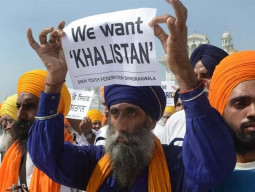1729321271-0/BeFunk_§-(30)1729321271-0.jpg)
In a significant escalation of diplomatic tensions between India and Canada, New Delhi has named a Canadian Border Services Agency (CBSA) official, Sandeep Singh Sidhu, in a terror case linked to Punjab militancy.
Sidhu, reportedly a member of the banned International Sikh Youth Federation (ISYF), has been accused of promoting terrorist activities in the Indian state of Punjab, further aggravating the already strained relations between the two nations.
According to reports, Sidhu is allegedly connected to Khalistani terrorist Lakhbir Singh Rode and other operatives.
He is accused of being involved in the assassination of Balwinder Singh Sandhu in 2020.
Sandhu, a Shaurya Chakra awardee, was a prominent figure in the fight against Khalistani separatists during Punjab’s insurgency and opposed the Khalistan referendums conducted by groups like Sikhs for Justice (SFJ) in Canada and the US.
This development comes after Canada’s Royal Canadian Mounted Police (RCMP) named Indian High Commissioner Sanjay Kumar Verma and other Indian diplomats as persons of interest in the killing of Khalistani leader Hardeep Singh Nijjar.
The Nijjar case, which emerged in 2023, has been a major flashpoint in the deteriorating India-Canada relationship, with Canadian Prime Minister Justin Trudeau publicly accusing India of involvement in Nijjar’s murder.
India’s inclusion of Sidhu on its list of fugitive terrorists is viewed as a tit-for-tat response to Canada’s expulsion of six Indian diplomats, including High Commissioner Verma, over the Nijjar assassination allegations.
In return, India expelled an equal number of Canadian diplomats and suspended visa services for Canadian citizens.
The strained relations stem from long-standing disagreements over Canada's handling of pro-Khalistan elements within its Sikh diaspora.
India has repeatedly accused Canada of providing a safe haven for Khalistani separatists, who it considers a threat to its national security.
Canadian authorities, on the other hand, emphasize the right to freedom of expression and peaceful protest, core democratic values in the country, even as they acknowledge the diplomatic tensions arising from these divergent views.
At the heart of the diplomatic crisis is the broader issue of transnational repression.
India has been accused of targeting pro-Khalistan activists on foreign soil, with Canada and the United States both publicly criticizing such actions as violations of sovereignty.
Previously, India criticized Canadian PM Justin Trudeau on October 17, calling his handling of the diplomatic crisis following the 2023 killing of a Sikh separatist "cavalier."
This comes as tensions between the two nations remain high after Canada accused India of orchestrating the assassination of Hardeep Singh Nijjar, a Sikh separatist and Canadian citizen, near Vancouver in June 2023.
In response, India and Canada expelled six diplomats each in a tit-for-tat move.
The Royal Canadian Mounted Police (RCMP), investigating Nijjar's murder, linked Indian agents to the crime, also involving the Bishnoi group, a criminal gang accused of murder and extortion in India.
Despite similar accusations from the US in a separate case, India's stance toward Canada remains defiant.
The assassination of Nijjar, in particular, prompted Canada to go public with its allegations against Indian diplomats, a move that has further strained bilateral ties.
This latest development, with Sidhu’s alleged involvement in promoting terrorism in Punjab, underscores the complexity of the India-Canada relationship, which has been deteriorating steadily over the past year.
Despite being strategic partners in the Indo-Pacific region, the two countries remain at odds over the Khalistan issue, with no immediate resolution in sight.
As diplomatic tensions escalate, both sides are likely to continue their tit-for-tat actions, further complicating their relationship and affecting broader geopolitical and economic cooperation.
1672385156-0/Andrew-Tate-(1)1672385156-0-405x300.webp)



















COMMENTS
Comments are moderated and generally will be posted if they are on-topic and not abusive.
For more information, please see our Comments FAQ